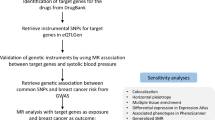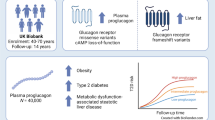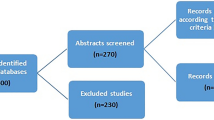Abstract
Insulin-like growth factor 1 (IGF1)(CA)19 and insulin-like growth factor-binding protein-3 (IGFBP-3)-202A/C gene polymorphisms had been focused by many epidemiological studies recently, which were associated with common cancer risk including colorectal, breast, prostate, and lung cancer. However, the findings of epidemiological investigations are not coincident. We did a systematic review and meta-analysis of case–control studies, including studies nested in cohorts, of the association between IGF1(CA)19 and IGFBP-3-202A/C gene polymorphism and prostate, colorectal, premenopausal and postmenopausal breast cancer. We identified 17 eligible studies (24 datasets), which included 9,744 cases and 11,332 controls. The result displays that individuals carrying (CA)19 allele had a subtly decreased risk of all cancer sites [OR(95 % CI) 0.92(0.87,0.97); 0.882(0.809,0.962); 0.902(0.849,0.958)] and postmenopausal breast cancer [OR(95 % CI) 0.893(0.832,0.959); 0.834(0.719,0.968); 0.862(0.776,0.958)] in allele contrast model, CA19/CA19 vs. non-CA19/non-CA19 model, and recessive genetic model. In subgroup analysis according to ethnicities, (CA)19 repeat polymorphism had an increased risk of common cancers in Asian [OR (95 % CI) of allele contrast model: 1.105(1.000,1.224); additive model: 1.103(0.844,1.441), 1.197(1.013,1.413); recessive model: 1.039(0.831,1.300); and dominant model: 1.191(1.030,1.376)]. On the other hand, IGFBP-3-202A/C gene polymorphism did not seem to be associated with all the cancer sites in any genetic model and ethnicity. In conclusion, the result of this meta-analysis indicates that the IGF1(CA)19 polymorphism is a candidate gene polymorphism for cancer susceptibility regardless of environmental factors, especially in Asian.





Similar content being viewed by others
References
Werner, H., & LeRoith, D. (1996). The role of the insulin-like growth factor system in human cancer. Advances in Cancer Research, 68, 183–223.
Hellawell, G. O., Turner, G. D., Davies, D. R., Poulsom, R., Brewster, S. F., & Macaulay, V. M. (2002). Expression of the type 1 insulin-like growth factor receptor is up-regulated in primary prostate cancer and commonly persists in metastatic disease. Cancer Research, 62(10), 2942–2950.
Firth, S. M., & Baxter, R. C. (2002). Cellular actions of the insulin-like growth factor binding proteins. Endocrine Reviews, 23(6), 824–854.
Bruning, P. F., Van Doorn, J., Bonfrer, J. M., Van Noord, P. A., Korse, C. M., Linders, T. C., et al. (1995). Insulin-like growth-factor-binding protein 3 is decreased in early-stage operable pre-menopausal breast cancer. International Journal of Cancer, 62(3), 266–270.
Neumuller, R. A., & Knoblich, J. A. (2009). Dividing cellular asymmetry: Asymmetric cell division and its implications for stem cells and cancer. Genes & Development, 23(23), 2675–2699. doi:10.1101/gad.1850809.
Rietveld, I., Janssen, J. A., Van Duijn, C. M., & Lamberts, S. W. (2003). A polymorphic CA repeat in the promoter region of the insulin-like growth factor-I (IGF-I) gene. European Journal of Epidemiology, 18(3), 191–193.
Rosendahl, A. H., Hietala, M., Henningson, M., Olsson, H., & Jernstrom, H. (2011). IGFBP1 and IGFBP3 polymorphisms predict circulating IGFBP-3 levels among women from high-risk breast cancer families. Breast Cancer Research and Treatment, 127(3), 785–794. doi:10.1007/s10549-010-1277-1.
Schernhammer, E. S., Hankinson, S. E., Hunter, D. J., Blouin, M. J., & Pollak, M. N. (2003). Polymorphic variation at the −202 locus in IGFBP3: Influence on serum levels of insulin-like growth factors, interaction with plasma retinol and vitamin D and breast cancer risk. International Journal of Cancer, 107(1), 60–64. doi:10.1002/ijc.11358.
Costalonga, E. F., Antonini, S. R., Guerra-Junior, G., Mendonca, B. B., Arnhold, I. J., & Jorge, A. A. (2009). The −202 A allele of insulin-like growth factor binding protein-3 (IGFBP3) promoter polymorphism is associated with higher IGFBP-3 serum levels and better growth response to growth hormone treatment in patients with severe growth hormone deficiency. Journal of Clinical Endocrinology and Metabolism, 94(2), 588–595. doi:10.1210/jc.2008-1608.
Pechlivanis, S., Wagner, K., Chang-Claude, J., Hoffmeister, M., Brenner, H., & Forsti, A. (2007). Polymorphisms in the insulin like growth factor 1 and IGF binding protein 3 genes and risk of colorectal cancer. Cancer Detection and Prevention, 31(5), 408–416. doi:10.1016/j.cdp.2007.10.001.
Samowitz, W. S., Wolff, R. K., Ma, K. N., Andersen, K., Caan, B., & Slattery, M. L. (2006). Polymorphisms in insulin-related genes predispose to specific KRAS2 and TP53 mutations in colon cancer. Mutation Research, 595(1–2), 117–124. doi:10.1016/j.mrfmmm.2005.10.014.
Wong, H. L., Delellis, K., Probst-Hensch, N., Koh, W. P., Van Den Berg, D., Lee, H. P., et al. (2005). A new single nucleotide polymorphism in the insulin-like growth factor I regulatory region associates with colorectal cancer risk in Singapore Chinese. Cancer Epidemiology, Biomarkers & Prevention, 14(1), 144–151. doi:14/1/144.
Slattery, M. L., Murtaugh, M., Caan, B., Ma, K. N., Neuhausen, S., & Samowitz, W. (2005). Energy balance, insulin-related genes and risk of colon and rectal cancer. International Journal of Cancer, 115(1), 148–154. doi:10.1002/ijc.20843.
Morimoto, L. M., Newcomb, P. A., White, E., Bigler, J., & Potter, J. D. (2005). Insulin-like growth factor polymorphisms and colorectal cancer risk. Cancer Epidemiology, Biomarkers & Prevention, 14(5), 1204–1211. doi:10.1158/1055-9965.EPI-04-0695.
Sarkissyan, M., Mishra, D. K., Wu, Y., Shang, X., Sarkissyan, S., & Vadgama, J. V. (2011). IGF gene polymorphisms and breast cancer in African-American and Hispanic women. International Journal of Oncology, 38(6), 1663–1673. doi:10.3892/ijo.2011.990.
Slattery, M. L., Sweeney, C., Wolff, R., Herrick, J., Baumgartner, K., Giuliano, A., et al. (2007). Genetic variation in IGF1, IGFBP3, IRS1, IRS2 and risk of breast cancer in women living in Southwestern United States. Breast Cancer Research and Treatment, 104(2), 197–209. doi:10.1007/s10549-006-9403-9.
Gonzalez-Zuloeta Ladd, A. M., Liu, F., Houben, M. P., Arias Vasquez, A., Siemes, C., Janssens, A. C., et al. (2007). IGF-1 CA repeat variant and breast cancer risk in postmenopausal women. European Journal of Cancer, 43(11), 1718–1722. doi:10.1016/j.ejca.2007.04.026.
Cleveland, R. J., Gammon, M. D., Edmiston, S. N., Teitelbaum, S. L., Britton, J. A., Terry, M. B., et al. (2006). IGF1 CA repeat polymorphisms, lifestyle factors and breast cancer risk in the Long Island Breast Cancer Study Project. Carcinogenesis, 27(4), 758–765. doi:10.1093/carcin/bgi294.
Wen, W., Gao, Y. T., Shu, X. O., Yu, H., Cai, Q., Smith, J. R., et al. (2005). Insulin-like growth factor-I gene polymorphism and breast cancer risk in Chinese women. International Journal of Cancer, 113(2), 307–311. doi:10.1002/ijc.20571.
Wagner, K., Hemminki, K., Israelsson, E., Grzybowska, E., Soderberg, M., Pamula, J., et al. (2005). Polymorphisms in the IGF-1 and IGFBP 3 promoter and the risk of breast cancer. Breast Cancer Research and Treatment, 92(2), 133–140. doi:10.1007/s10549-005-2417-x.
DeLellis, K., Ingles, S., Kolonel, L., McKean-Cowdin, R., Henderson, B., Stanczyk, F., et al. (2003). IGF1 genotype, mean plasma level and breast cancer risk in the Hawaii/Los Angeles multiethnic cohort. British Journal of Cancer, 88(2), 277–282. doi:10.1038/sj.bjc.6600728.
Hernandez, W., Grenade, C., Santos, E. R., Bonilla, C., Ahaghotu, C., & Kittles, R. A. (2007). IGF-1 and IGFBP-3 gene variants influence on serum levels and prostate cancer risk in African-Americans. Carcinogenesis, 28(10), 2154–2159. doi:10.1093/carcin/bgm190.
Chen, C., Freeman, R., Voigt, L. F., Fitzpatrick, A., Plymate, S. R., & Weiss, N. S. (2006). Prostate cancer risk in relation to selected genetic polymorphisms in insulin-like growth factor-I, insulin-like growth factor binding protein-3, and insulin-like growth factor-I receptor. Cancer Epidemiology, Biomarkers & Prevention, 15(12), 2461–2466. doi:10.1158/1055-9965.EPI-06-0541.
Neuhausen, S. L., Slattery, M. L., Garner, C. P., Ding, Y. C., Hoffman, M., & Brothman, A. R. (2005). Prostate cancer risk and IRS1, IRS2, IGF1, and INS polymorphisms: Strong association of IRS1 G972R variant and cancer risk. Prostate, 64(2), 168–174. doi:10.1002/pros.20216.
Friedrichsen, D. M., Hawley, S., Shu, J., Humphrey, M., Sabacan, L., Iwasaki, L., et al. (2005). IGF-I and IGFBP-3 polymorphisms and risk of prostate cancer. Prostate, 65(1), 44–51. doi:10.1002/pros.20259.
Schildkraut, J. M., Demark-Wahnefried, W., Wenham, R. M., Grubber, J., Jeffreys, A. S., Grambow, S. C., et al. (2005). IGF1(CA)19 repeat and IGFBP-3-202 A/C genotypes and the risk of prostate cancer in Black and White men. Cancer Epidemiol Biomarkers Prev, 14(2), 403–408. doi:10.1158/1055-9965.EPI-04-0426.
Stroup, D. F., Berlin, J. A., Morton, S. C., Olkin, I., Williamson, G. D., Rennie, D., et al. (2000). Meta-analysis of observational studies in epidemiology: A proposal for reporting. Meta-analysis of observational studies in epidemiology (MOOSE) group. JAMA, 283(15), 2008–2012. doi:jst00003.
Lau, J., Ioannidis, J. P., & Schmid, C. H. (1997). Quantitative synthesis in systematic reviews. Annals of Internal Medicine, 127(9), 820–826.
DerSimonian, R., & Laird, N. (1986). Meta-analysis in clinical trials. Controlled Clinical Trials, 7(3), 177–188. doi:0197-2456(86)90046-2.
Mantel, N., & Haenszel, W. (1959). Statistical aspects of the analysis of data from retrospective studies of disease. Journal of the National Cancer Institute, 22(4), 719–748.
Egger, M., Davey Smith, G., Schneider, M., & Minder, C. (1997). Bias in meta-analysis detected by a simple, graphical test. BMJ, 315(7109), 629–634.
Reeves, S. G., Rich, D., Meldrum, C. J., Colyvas, K., Kurzawski, G., Suchy, J., et al. (2008). IGF1 is a modifier of disease risk in hereditary non-polyposis colorectal cancer. International Journal of Cancer, 123(6), 1339–1343. doi:10.1002/ijc.23668.
Li, L., Cicek, M. S., Casey, G., & Witte, J. S. (2004). No association between genetic polymorphisms in IGF-I and IGFBP-3 and prostate cancer. Cancer Epidemiology, Biomarkers & Prevention, 13(3), 497–498.
Giovannucci, E., Haiman, C. A., Platz, E. A., Hankinson, S. E., Pollak, M. N., & Hunter, D. J. (2002). Dinucleotide repeat in the insulin-like growth factor-I gene is not related to risk of colorectal adenoma. Cancer Epidemiology, Biomarkers & Prevention, 11(11), 1509–1510.
Missmer, S. A., Haiman, C. A., Hunter, D. J., Willett, W. C., Colditz, G. A., Speizer, F. E., et al. (2002). A sequence repeat in the insulin-like growth factor-1 gene and risk of breast cancer. International Journal of Cancer, 100(3), 332–336. doi:10.1002/ijc.10473.
Figer, A., Karasik, Y. P., Baruch, R. G., Chetrit, A., Papa, M. Z., Sade, R. B., et al. (2002). Insulin-like growth factor I polymorphism and breast cancer risk in Jewish women. The Israel Medical Association Journal: IMAJ, 4(10), 759–762.
Yu, H., Li, B. D., Smith, M., Shi, R., Berkel, H. J., & Kato, I. (2001). Polymorphic CA repeats in the IGF-I gene and breast cancer. Breast Cancer Research and Treatment, 70(2), 117–122.
Engeland, A., Tretli, S., & Bjorge, T. (2003). Height, body mass index, and prostate cancer: A follow-up of 950000 Norwegian men. British Journal of Cancer, 89(7), 1237–1242. doi:10.1038/sj.bjc.6601206.
Chen, X., Guan, J., Song, Y., Chen, P., Zheng, H., Tang, C., et al. (2008). IGF-I (CA) repeat polymorphisms and risk of cancer: A meta-analysis. Journal of Human Genetics, 53(3), 227–238. doi:10.1007/s10038-007-0241-3.
Author information
Authors and Affiliations
Corresponding authors
Rights and permissions
About this article
Cite this article
Quan, H., Tang, H., Fang, L. et al. IGF1(CA)19 and IGFBP-3-202A/C Gene Polymorphism and Cancer Risk: A Meta-analysis. Cell Biochem Biophys 69, 169–178 (2014). https://doi.org/10.1007/s12013-013-9784-4
Published:
Issue Date:
DOI: https://doi.org/10.1007/s12013-013-9784-4




